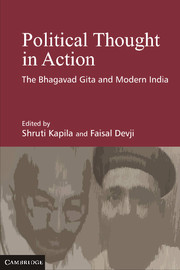Book contents
- Frontmatter
- Contents
- List of Contributors
- Acknowledgements
- Introduction
- 1 India, the Bhagavad Gita and the World
- 2 The Transnational Gita
- 3 The Transfiguration of Duty in Aurobindo's Essays on the Gita
- 4 Gandhi's Gita and Politics as Such
- 5 Gandhi on Democracy, Politics and the Ethics of Everyday Life
- 6 Morality in the Shadow of Politics
- 7 Ambedkar's Inheritances
- 8 Rethinking Knowledge with Action: V. D. Savarkar, the Bhagavad Gita and Histories of Warfare
- 9 A History of Violence
- Index
1 - India, the Bhagavad Gita and the World
Published online by Cambridge University Press: 05 January 2014
- Frontmatter
- Contents
- List of Contributors
- Acknowledgements
- Introduction
- 1 India, the Bhagavad Gita and the World
- 2 The Transnational Gita
- 3 The Transfiguration of Duty in Aurobindo's Essays on the Gita
- 4 Gandhi's Gita and Politics as Such
- 5 Gandhi on Democracy, Politics and the Ethics of Everyday Life
- 6 Morality in the Shadow of Politics
- 7 Ambedkar's Inheritances
- 8 Rethinking Knowledge with Action: V. D. Savarkar, the Bhagavad Gita and Histories of Warfare
- 9 A History of Violence
- Index
Summary
In this essay, I take a broad, transnational view of the political and philosophical debate about India, its history and its place in the world during the later nineteenth and the early twentieth centuries. It was this debate which gave visibility and range to the Bhagavad Gita as a critical site on which the ethics and politics of Indian society could be discussed and contested. The Gita needed India to make possible its rise to global significance much more than India needed the Gita. For this was the period when the concept of dharma itself was being disseminated across the world by public teachers and cultural apologists such as Keshub Chunder Sen and Swami Vivekananda. My initial intention was to try to understand the reception of the Gita in the West through the works of British officials, theosophists, European supporters of Indian nationalism, such as Annie Besant, and sympathetic oriental scholars, such as Friedrich Max-Muller. But it soon became apparent that this “Western” debate could not be hived off from the internal debate within India itself about the meaning and relevance of the text.
This, indeed, was an example of the outward journey of Indian concepts into the global arena of political and moral thought. What we see is the decomposition of the attempt of earlier European scholars to create a separate category of Indian “religion” and to constrain it within an oriental sphere of passive spirituality in contrast to the active spirituality of the Christian and rationalist West.
- Type
- Chapter
- Information
- Political Thought in ActionThe Bhagavad Gita and Modern India, pp. 1 - 24Publisher: Cambridge University PressPrint publication year: 2013
- 1
- Cited by



